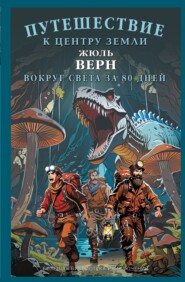По всем вопросам обращайтесь на: info@litportal.ru
(©) 2003-2024.
✖
Round the World in Eighty Days
Настройки чтения
Размер шрифта
Высота строк
Поля
Passe-partout was dumfounded, and although he was very anxious to cross the river, he thought the proposed plan a little too American.
"Besides," he thought, "there is an easier way, which does not seem to have occurred to either of them;" so he said aloud to one of the passengers:
"The engineer's plan seems to me somewhat dangerous; but – "
"Eighty chances!" replied the person addressed, turning away.
"I know that," replied Passe-partout, as he spoke to another; "but an idea – "
"Ideas are no use," replied the American; "the engineer tells us we can cross."
"No doubt," replied Passe-partout; "but perhaps it would be more prudent – "
"What, prudent!" exclaimed Colonel Proctor, who was ready to quarrel with anyone suggesting prudence. "Do you not understand that we are going across at full speed? Do you hear, at full speed?"
"I know, I know," said Passe-partout, whom no one would allow to finish his sentence; "but it would be, if not more prudent, since that word displeases you, at any rate more natural – "
"Who is this, what's this? Who is talking about natural?" cried the passengers on all sides.
Poor Passe-partout did not know which way to turn.
"Are you afraid?" asked Colonel Proctor.
"I afraid?" cried Passe-partout; "you think so, do you? I will show these people when a Frenchman can be as American as themselves."
"All aboard!" cried the guard.
"Yes, all get in," muttered Passe-partout; "but you cannot prevent my thinking that it would be much more natural for us to cross the bridge on foot and let the train follow."
But no one heard this wise reflection, and if so, probably no one would have acknowledged its justice.
The passengers took their places, as did Passe-partout, without saying what had happened. The whist-players were still deep in their game.
The engine-driver whistled and then backed his train for nearly a mile, then whistling again he started forward. The speed increased to a fearful extent, and rushing along at a pace of nearly a hundred miles an hour, seemed hardly to touch the rails at all.
They passed over like a flash of lightning. No one saw anything of the bridge; the train leaped, as it were, from bank to bank, and could not be stopped till it had passed the station for some miles.
Scarcely had the train crossed the bridge when the whole structure fell with a tremendous crash into the rapids beneath!
CHAPTER XXIX
In which certain Incidents are told which are never met with except on Railroads in the United States.
That evening the train proceeded without interruption; passed Fort Saunders, crossed Cheyenne Pass, and arrived at Evans' Pass. Here the railroad reached its greatest elevation, eight thousand and ninety-one feet above the sea. The track was now downhill all the way to the Atlantic, across naturally level plains. From here the Grand Trunk Line led to Denver, the capital of Colorado State, rich in gold and silver mines, and boasting more than fifty thousand inhabitants.
Three days and three nights had now been passed in accomplishing one thousand three hundred and eighty-two miles; four days and four nights more would suffice to reach New York, and Phileas Fogg had not lost time.
During the night they had passed Camp Walbach, and entered Nebraska at eleven, passing Julesburg on the south branch of the Platte river. It was here that General Dodge inaugurated the Union Pacific road on the 23rd of October, 1867. Here two powerful locomotives with nine carriages full of guests stopped, three cheers were given, the Sioux and Pawnee Indians had a sham fight, fireworks were let off, and the first number of a paper called The Railway Pioneer was printed in a press carried in the train.
Fort MacPherson was passed at eight in the morning; they had still three hundred and fifty-seven miles to go to Omaha. At nine o'clock the train stopped at North Platte, a town built between the two arms of the river.
The hundred-and-first meridian was now passed.
Mr. Fogg and his partner had resumed their whist; none of them, not even the dummy, complained of the length of the journey. Fix had at first won several guineas which he now seemed about to lose, but he was not a less passionate player than Fogg. Fortune distinctly favoured that gentleman, and showered trumps and honours upon him.
On one occasion he was on the point of playing a spade, when a voice behind him said, "I should play a diamond."
The players all looked up, and beheld Colonel Proctor. He and Fogg recognised each other at the same moment.
"Oh, you are that Britisher, are you?" exclaimed the Colonel. "So you are going to play a spade?"
"Yes, and I play it too," replied Fogg coldly, as he threw down the ten.
"Well, I choose to have diamonds," said Proctor insolently. He made a movement as if to seize the card just played, adding, "You know nothing about whist."
"Perhaps I do, as well as other people," said Fogg, rising.
"You have only got to try, you son of a John Bull," said the stout man.
Mrs. Aouda now turned very pale; she seized Fogg by the arm, and pulled him back. Passe-partout was quite ready to throw himself upon the American, who continued to regard his adversary with an insolent stare, but Fix rose and said, "You forget that this is my business, sir; I was not only insulted, but struck."
"Mr. Fix, excuse me," said Fogg; "this is entirely my business. By pretending that I did not know how to play, the Colonel has insulted me, and shall give me satisfaction."
"When and where you please," said the American; "name your weapons."
Aouda tried to keep Mr. Fogg back; the detective also tried to make the quarrel his own; Passe-partout wanted to throw the Colonel out of the window, but a sign from his master checked him. Mr. Fogg left the car, and the American followed him to the platform.
"Sir," said Fogg, "I am in a great hurry to return to Europe; any delay will be very prejudicial to my interest."
"What is all that to me?" said the Colonel.
"Sir," continued Fogg, very politely, "after our dispute at San Francisco, I had promised myself to return to America and find you out, when I had finished my business in England."
"Really!"
"Will you meet me six months hence?"
"Why don't you say six years?"
"I said six months," said Fogg, "and I shall not fail to be at the rendezvous."
"This is all humbug," cried Proctor; "it must be now or never."
"Very well," said Mr. Fogg; "are you going to New York?"
"No."
"To Chicago?"

















